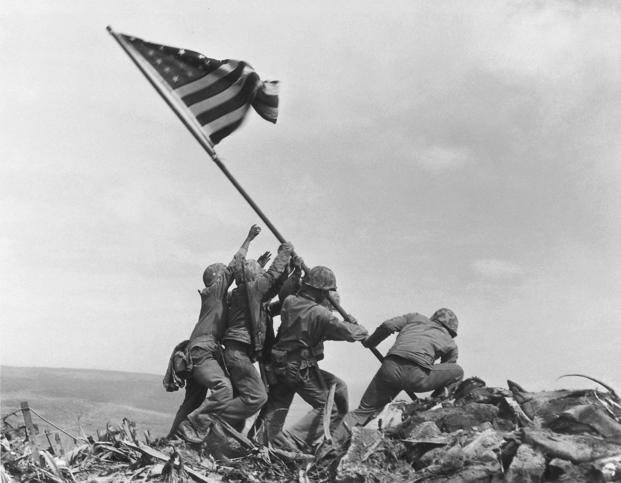Since taking control of Afghanistan, the Taliban has been eager to release pictures of its fighters equipped with modern weapons and tactical uniforms. One image in particular -- an apparent recreation of the famous moment when Marines raised the American flag on Iwo Jima during World War II -- has quickly gained attention and shown off how the group is tending carefully to its new public image.
The photo, which purports to show the Taliban's Badri 313 battalion, features four men clad in full and matching tactical gear and rifles hoisting the white flag of the Taliban in the Afghanistan mountains. The men and flag, which is only half-raised, bear a striking similarity to Associated Press photographer Joe Rosenthal's iconic photo of Marines raising the U.S. flag at Mount Suribachi amid the Battle of Iwo Jima.
Rosenthal's photo not only won him the Pulitzer Prize just months after it was taken, it instantly became symbolic of the war in the Pacific and the Marine Corps.

The service would go on to make the image the model for the Marine Corps War Memorial in Arlington, Virginia.
Dr. Haroro Ingram, a senior research fellow at the Program on Extremism at George Washington University whose research includes looking at militant Islamist propaganda that targets English-speaking audiences, says the photo is indicative of a larger transformation within the Taliban.
"If this is legit, there is no doubt Badri 313 are taking the piss with this photo," Ingram told Military.com in an email.
Read Next: Afghanistan: The War That Made War Normal
The Marine Corps did not comment on the photo or its similarity to the famed Iwo Jima image.
"More importantly, I think it is a small and relatively superficial example of what is a pretty profound transformation in the Taliban's campaign efforts," Ingram added. "There is no question that the Taliban has improved its propaganda efforts."
The researcher explained that the Taliban likely "began to have a better appreciation for the power of propaganda" when it noticed that "exaggerating the impact of airstrikes on local communities and highlighting the death of innocent civilians contributed to, at times, a hesitancy on our side."
There's also the fact that the Taliban's resurgence comes after the region saw the rise and fall of the Islamic State. Multiple researchers noted that ISIS used social media strategically in an effort to paint itself as a powerful and influential force in the region and as an effective government for those under its rule.
Although an Islamic State affiliate, ISIS-Khorasan, is operating in the region, it is important to note that it is enemies with the Taliban.
U.S. officials have said that they regard the ISIS offshoot as a threat, especially since it may see the chaotic evacuation and political uncertainty in Afghanistan as an opportunity both to hit the U.S. and embarrass the Taliban.
Since seizing control of the country last week, the Taliban has sought to assure fellow Afghans and the world that its rule will be peaceful. A Taliban spokesman, Suhail Shaheen, told NPR last Wednesday that American troops and civilians will not be attacked.
"The peace process efforts have also meant that the Taliban's intelligentsia is more politically nuanced and savvier in their communications than in the past," Ingram noted.
-- Konstantin Toropin can be reached at konstantin.toropin@military.com. Follow him on Twitter @ktoropin.
Related: ISIS Threats, Taliban 'Red Line' Against Extension Complicate Afghanistan Evacuation















